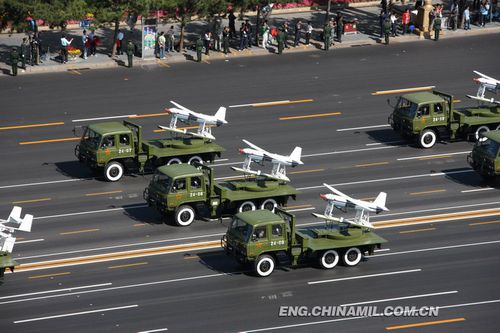Technology raises military stakes in Northeast Asia
- By Geoffrey Murray
 0 Comment(s)
0 Comment(s) Print
Print E-mail
China.org.cn, October 9, 2011
E-mail
China.org.cn, October 9, 2011
Northeast Asia is shaping up afresh as a cockpit of potential instability through growing high-tech military rivalry between various countries. It's a volatile geopolitical mix of economic and strategic interests and national pride.
China, Japan and the United States are the leading powers that develop military technologies quickly, but one could also add the occupants of the Korean Peninsula to the equation of possible flashpoints.
A close perusal of government statements, military analyses and news reports reveals a worrying pattern.
The United States has shown the way with its extensive, and seemingly successful, use of 'drones' - remote-controlled, pilotless aircraft - in eliminating some of the global terrorist leadership hiding away in Iraq, Pakistan and Afghanistan.
This is a land-based system, but drones that can operate from aircraft carriers are under development. The first tests took place earlier this year.
Officially, the US does not say who these might be used against; but military analysts are less coy, suggesting such technology could help counter China's growing strength in some military sectors.
The Washington-based Center for New American Security, for one, argues that: 'Chinese military modernization is the major long-term threat the US must prepare for in the Asia-Pacific region, and robotic vehicles - aerial and subsurface (underwater) - are increasingly critical to countering that potential threat.'
While China insists its military expansion program is not designed to threaten others, there is no doubt it is developing air, naval and missile capabilities that could challenge American supremacy in the Pacific (mainly providing a guarantee to allies such as Japan and South Korea).
In this regard, much publicity has been given to the as-yet unproven DF 21D "carrier killer" missile, designed to be launched from land, with enough accuracy to hit a moving aircraft carrier at a distance of more than 1,500km.
Last November, it became clear that China was also working hard to develop a range of unmanned aerial vehicles (UVAs) after a number were displayed at a trade show in Zhuhai.
|
|
|
The unmanned aerial vehicles (UVAs) formation marches past the Tian'anmen Square in the military parade in the celebration of the 60th anniversary of the founding of People's Republic of China held in Beijing Oct.1, 2009. |
Although still somewhat inferior to the drones developed by the world technology leaders, the United States and Israel, the models displayed still showed considerable advancement from primitive ones that first appeared just four years ago.






